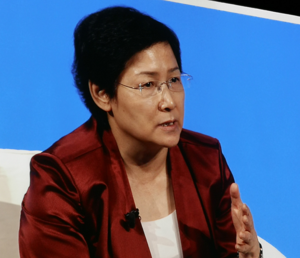WGC '18: Beijing Gas Group chair discusses China's gas future, LNG trade with US
By Adrienne Blume, Editor
WASHINGTON DC—During the Day 2 opening keynote session at the 2018 World Gas Conference (WGC), Yalan Li, Chairperson of the Board of Directors for Beijing Gas Group Co., shared China's perspective on the future of China's gas sector.
The keynote session was moderated by Nobuo Tanaka, Chairman of the Sasakawa Peace Foundation and Former Executive Director of the International Energy Agency.
China eyes gas to solve environmental, energy sustainability challenges. China, the world's largest energy consumer, presently accounts for 46% of global coal production and 51% of coal consumption. The country also strongly supports Paris agreement, and is dedicated to developing clean energy, including gas, renewable fuels
China holds an estimated 50 Tm3 of conventional
China operates 18 LNG regasification terminals with a total receiving capacity of 60 MMtpy. According to Ms. Li, seven of these 18 terminals are under expansion, and 11 new receiving terminals are planned to be built.
The Chairperson noted that China's increased use of gas has noticeably improved Beijing's air quality. Fine particles (PM 2.5) emissions in Beijing have decreased from 90 micrograms to 58 micrograms over the past 5 yr.
China's goal, Ms. Li said, is to boost the share of gas in the country's energy mix from 7% to 10% by 2020, with a total gas volume exceeding 300 Bm3y. She also mentioned that China will host the WGC in 2024, by which time the country aims to boost its gas consumption to 400 Bm3y, making it the second-largest gas consumer in the world.
Gas expansion challenges. Ms. Li noted that China is facing a shortage of storage and infrastructure. Storage capacity accounts for only 3% of yearly gas consumption.
Also, some in the Chinese government view gas as more of a "transition fuel," and place heavier emphasis on renewable fuels, making prejudice against natural gas is an issue to overcome. Furthermore, since China has such a large coal supply, some say that coal use should be expanded to make use of China's domestic resources instead of importing gas from foreign nations.
To overcome these restrictive views and make natural gas a major fuel, Ms. Li named several important initiatives for Chinese energy companies and policymakers:
- Enhance exploration and production of resources
- Invest in digitalization and major technology breakthroughs
- Advocate for natural gas use for its abundance, low emissions, and high efficiency
- Consider the advantages of imported gas, rather than emphasizing only domestic energy resources.
Future for LNG trade between China and US? Following Ms. Li's presentation, Mr. Tanaka asked if China plans to import LNG from
"That is an important question, and a hard question," Ms. Li said.
She noted that China's top priority is
"Price plays a big role here," Ms. Li added. "We hope the LNG import price will be more reasonable from America [in the future]."
The WGC is taking place from June 26–29 in Washington DC.







Comments